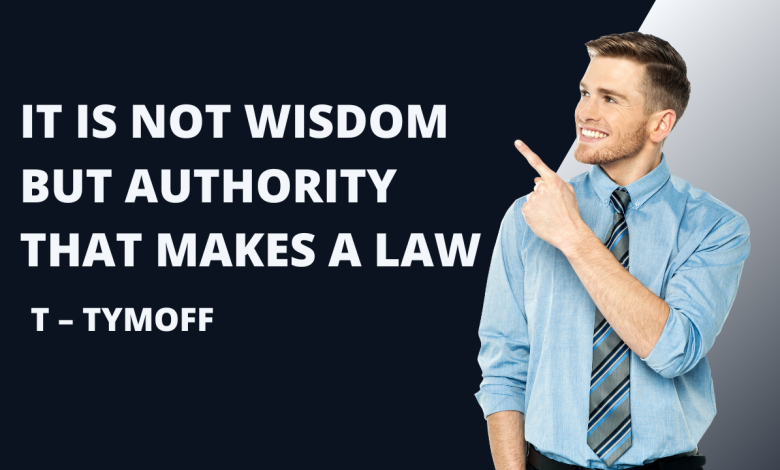It is Not Wisdom But Authority That Makes a Law. T – Tymoff : Commanding Influence

Laws are not solely based on wisdom or intelligence but are established and enforced through the power and authorization given to governing bodies. This emphasizes the importance of understanding the role of authority in shaping legal systems. By examining the relationship between authority and laws, we can gain insight into the dynamics of legislation and its impact on society.
Stay tuned as we delve into the complexities behind the creation and implementation of laws based on authority rather than wisdom alone.
Understanding The Dynamics Of Law Creation
Law creation is not solely based on wisdom, but rather on authority. Understanding the dynamics of law creation entails exploring the significance of authority in this process. Authority plays a vital role in the making of laws, as it holds the power to establish and enforce regulations.
By examining the relationship between authority and wisdom, we can gain insights into how laws are formulated and implemented. While wisdom may offer valuable insights, it is ultimately the authority that has the ability to establish legal frameworks and ensure compliance.
Recognizing this dynamic helps us comprehend the complexity of lawmaking and appreciate the balance between wisdom and authority in shaping our legal systems. Through analyzing this relationship, we can gain a deeper understanding of the forces at play in the creation of laws.
The Role Of Authority In Guiding Society
Authority plays a crucial role in maintaining social order and guiding society through law enforcement. Without the influence of authority, the consequences of lawmaking could be detrimental. When individuals in positions of power lack the necessary authority, their ability to effectively establish and enforce laws is compromised.
This can lead to chaos and the breakdown of societal norms. Authority ensures that laws are respected and followed, providing a sense of order and stability. Its impact on law enforcement is significant, as it sets the foundation for maintaining peace and harmony within a community.
Without authority, society could descend into anarchy, with individuals acting on their own beliefs and desires, disregarding the greater good. Therefore, it is not just wisdom, but also authority, that plays a vital role in making and upholding the law.
Critiquing The Influence Of Authority In Lawmaking
Authority plays a crucial role in lawmaking, yet wisdom should not be overlooked. The limitations of ruling without wisdom can result in unjust laws. When authority takes precedence over thoughtful decision-making, the needs and rights of individuals may be disregarded.
It is essential to analyze instances where authority has led to the creation of laws that fail to consider the complexities of society. By critiquing the influence of authority in lawmaking, we can raise awareness of the potential pitfalls and strive for a more balanced approach.
It is not enough for laws to simply be authorized; they must also reflect the wisdom and understanding necessary to promote justice and fairness for all. By questioning and examining the impact of authority, we can contribute to a more equitable legal system.
Balancing Wisdom And Authority In Lawmaking
Balancing wisdom and authority in lawmaking is crucial for creating effective regulations. By incorporating wisdom into law creation, we emphasize the importance of thoughtful decision-making. Exploring alternative approaches that combine wisdom and authority allows us to consider diverse perspectives and promote fairness.
It is not merely authority that should shape laws; wisdom contributes the essential elements of logic, reason, and experience. When crafting legislation, decision-makers must strive to strike a balance between these two pillars, ensuring that laws are not only authoritative but also wise.
This harmonious blend of wisdom and authority ensures the creation of legislation that truly serves the best interests of society as a whole. By delving into alternative approaches, we can find innovative solutions that successfully navigate the complexities of lawmaking.
Frequently Asked Questions On It Is Not Wisdom But Authority That Makes A Law. T – Tymoff
How Does Authority Contribute To The Creation Of Laws?
Authority plays a critical role in creating laws as it ensures that there is a system in place to enforce and uphold them. Without authority, laws would lack legitimacy and wouldn’t be able to be implemented effectively.
What Is The Difference Between Wisdom And Authority When It Comes To Making Laws?
While wisdom involves making decisions based on knowledge and experience, authority is about having the power and control to enforce those decisions. In the context of lawmaking, authority is often the driving force behind the implementation of laws, even if they may not always be the most wise or rational.
Why Is It Important To Consider Both Wisdom And Authority In Lawmaking?
Considering both wisdom and authority is crucial in lawmaking to strike a balance between making rational decisions and ensuring effective enforcement. Wisdom brings about fair and just laws, while authority ensures their implementation. Neglecting one over the other can lead to either arbitrary rule or lack of order.
Conclusion
The power of authority has always played a significant role in crafting and enforcing laws throughout history. “It is Not Wisdom But Authority That Makes a Law” explores this timeless truth. Throughout the blog post, we have examined the origin of laws and the influence of authority.
By delving into historical examples, we have come to understand that the authority behind a law often carries more weight than its inherent wisdom. From ancient rulers to modern governments, the ability to enforce laws has relied on authority and the fear of consequences.
As individuals, it is essential to recognize the role authority plays in shaping our legal systems. This allows us to critically analyze the laws and challenge authority when necessary. Ultimately, understanding the dynamics between wisdom and authority can help us navigate and shape a fairer legal landscape for the future.





